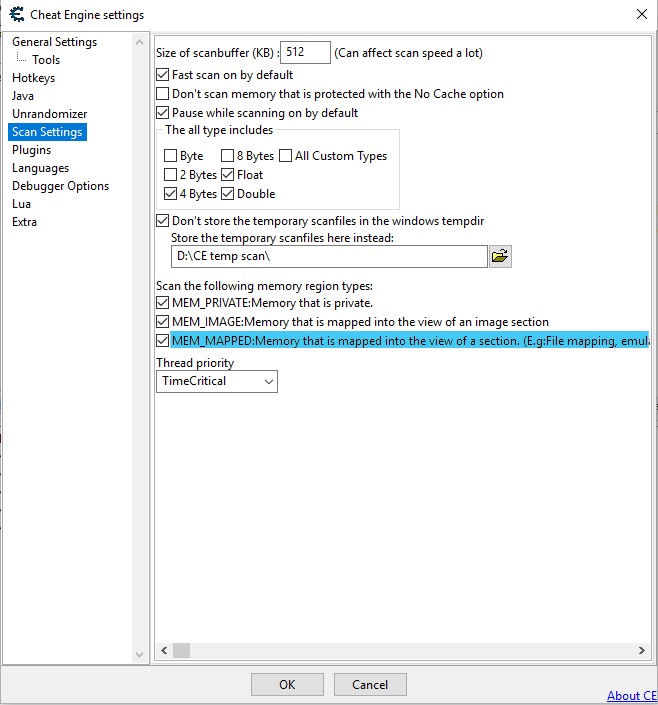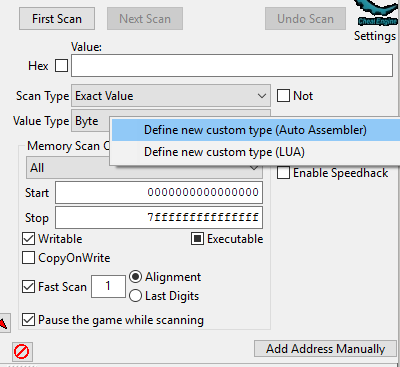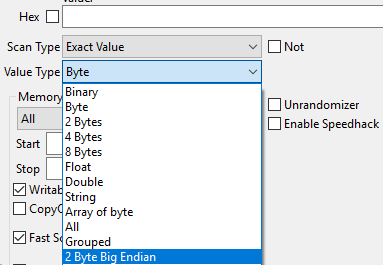To use Cheat Engine on RPCS3, you need to set up a few things beforehand.
MEM_MAPPED Settings
First, we need to enable MEM_MAPPED option to let Cheat Engine have the ability to scan Mapped memory regions. As most of the games emulated are stored in mapped regions, this option is essential for using Cheat Engine in emulators.
In Cheat Engine, go to Edit -> Settings.

Navigate to the Scan Settings tab, and ensure that all three MEM options are enabled, as shown in the figure below.

Big Endian Support
Most emulators operates in Big Endian value type. To put it simply, Big Endian is the reversal of a normal byte array. For example, 00 01 02 03 in Big Endian will be 03 02 01 00. By default cheat engine does not include Big Endian value type, so we will need to define it ourselves.
In cheat engine, right click on the value type and select Define new custom type (Auto Assembler).

A new window will pop up with codes in it. Delete it all and paste in the codes down below.
alloc(TypeName,256)
alloc(ByteSize,4)
alloc(ConvertRoutine,1024)
alloc(ConvertBackRoutine,1024)
alloc(UsesFloat,1)
alloc(CallMethod,1)
TypeName:
db '2 Byte Big Endian',0
ByteSize:
dd 2
//The convert routine should hold a routine that converts the data to an integer (in eax)
//function declared as: stdcall int ConvertRoutine(unsigned char *input);
//Note: Keep in mind that this routine can be called by multiple threads at the same time.
ConvertRoutine:
//jmp dllname.functionname
[64-bit]
//or manual:
//parameters: (64-bit)
//rcx=address of input
xor eax,eax
mov ax,[rcx] //eax now contains the bytes 'input' pointed to
xchg ah,al //convert to big endian
ret
[/64-bit]
[32-bit]
//jmp dllname.functionname
//or manual:
//parameters: (32-bit)
push ebp
mov ebp,esp
//[ebp+8]=input
//example:
mov eax,[ebp+8] //place the address that contains the bytes into eax
mov ax,[eax] //place the bytes into eax so it's handled as a normal 4 byte value
and eax,ffff //cleanup
xchg ah,al //convert to big endian
pop ebp
ret 4
[/32-bit]
//The convert back routine should hold a routine that converts the given integer back to a row of bytes (e.g when the user wats to write a new value)
//function declared as: stdcall void ConvertBackRoutine(int i, unsigned char *output);
ConvertBackRoutine:
//jmp dllname.functionname
//or manual:
[64-bit]
//parameters: (64-bit)
//ecx=input
//rdx=address of output
//example:
xchg ch,cl //convert the little endian input into a big endian input
mov [rdx],cx //place the integer the 4 bytes pointed to by rdx
ret
[/64-bit]
[32-bit]
//parameters: (32-bit)
push ebp
mov ebp,esp
//[ebp+8]=input
//[ebp+c]=address of output
//example:
push eax
push ebx
mov eax,[ebp+8] //load the value into eax
mov ebx,[ebp+c] //load the address into ebx
//convert the value to big endian
xchg ah,al
mov [ebx],ax //write the value into the address
pop ebx
pop eax
pop ebp
ret 8
[/32-bit] Once you have pasted it in, double check the script, and press OK

After that, the value type you defined will be added in the value type selection, as shown below.

Using the same method, add in the 4 byte Big Endian value type.
alloc(TypeName,256)
alloc(ByteSize,4)
alloc(ConvertRoutine,1024)
alloc(ConvertBackRoutine,1024)
alloc(UsesFloat,1)
alloc(CallMethod,1)
TypeName:
db '4 Byte Big Endian',0
ByteSize:
dd 4
//The convert routine should hold a routine that converts the data to an integer (in eax)
//function declared as: stdcall int ConvertRoutine(unsigned char *input);
//Note: Keep in mind that this routine can be called by multiple threads at the same time.
ConvertRoutine:
//jmp dllname.functionname
[64-bit]
//or manual:
//parameters: (64-bit)
//rcx=address of input
xor eax,eax
mov eax,[rcx] //eax now contains the bytes 'input' pointed to
bswap eax //convert to big endian
ret
[/64-bit]
[32-bit]
//jmp dllname.functionname
//or manual:
//parameters: (32-bit)
push ebp
mov ebp,esp
//[ebp+8]=input
//example:
mov eax,[ebp+8] //place the address that contains the bytes into eax
mov eax,[eax] //place the bytes into eax so it's handled as a normal 4 byte value
bswap eax
pop ebp
ret 4
[/32-bit]
//The convert back routine should hold a routine that converts the given integer back to a row of bytes (e.g when the user wats to write a new value)
//function declared as: stdcall void ConvertBackRoutine(int i, unsigned char *output);
ConvertBackRoutine:
//jmp dllname.functionname
//or manual:
[64-bit]
//parameters: (64-bit)
//ecx=input
//rdx=address of output
//example:
bswap ecx //convert the little endian input into a big endian input
mov [rdx],ecx //place the integer the 4 bytes pointed to by rdx
ret
[/64-bit]
[32-bit]
//parameters: (32-bit)
push ebp
mov ebp,esp
//[ebp+8]=input
//[ebp+c]=address of output
//example:
push eax
push ebx
mov eax,[ebp+8] //load the value into eax
mov ebx,[ebp+c] //load the address into ebx
//convert the value to big endian
bswap eax
mov [ebx],eax //write the value into the address
pop ebx
pop eax
pop ebp
ret 8
[/32-bit] And the same for Float Big Endian
alloc(TypeName,256)
alloc(ByteSize,4)
alloc(ConvertRoutine,1024)
alloc(ConvertBackRoutine,1024)
alloc(UsesFloat,4)
alloc(CallMethod,1)
TypeName:
db 'Float Big Endian',0
ByteSize:
dd 4
UsesFloat:
db 01
ConvertRoutine:
[32-bit]
push ebp
mov ebp,esp
mov eax,[ebp+8] //place the address that contains the bytes into eax
mov eax,[eax] //place the bytes into eax
bswap eax
pop ebp
ret 4
[/32-bit]
[64-bit]
//rcx=address of input
mov eax,[rcx] //eax now contains the bytes 'input' pointed to
bswap eax
ret
[/64-bit]
ConvertBackRoutine:
[32-bit]
push ebp
mov ebp,esp
//[ebp+8]=input
//[ebp+c]=address of output
push eax
push ebx
mov eax,[ebp+8] //load the value into eax
mov ebx,[ebp+c] //load the address into ebx
bswap eax
mov [ebx],eax //write the value into the address
pop ebx
pop eax
pop ebp
ret 8
[/32-bit]
[64-bit]
//ecx=input
//rdx=address of output
bswap ecx
mov [rdx],ecx //place the integer the 4 bytes pointed to by rdx
ret
[/64-bit]Once you pressed OK, you are set to go!
But just to be sure, check if your value type has 3 new selections available.

And when you want to scan for values in game, please use their big endian counterpart.
Leave a comment